- Home
- Jacqueline Wilson
Clover Moon Page 2
Clover Moon Read online
Page 2
‘You are not my mother, thank the Lord,’ I’d said, so she shook me harder, flapping me like a dusty doormat. For two pins I think she’d have used a carpet beater on me.
Still, I was the winner that day. I’d bought the buns and shared them immediately because I knew that once she saw the money she’d want to get her hands on it. We all had our buns safely in our stomachs. In fact Megs had two because there’d been one left over and I insisted she have it because she’s the skinniest.
I looked hopefully at passing gentlemen now, and any ladies with dangling reticules, but couldn’t spot any fallen wallets or purses today. I walked on, chewing the last of my carrot, dodging in and out of the stalls, then skipping quickly down the length of the road to warm myself up. I didn’t have a shawl, let alone a coat, and my feet were always cold because the soles of my boots were patched with newspaper.
I saw myself reflected in the shop windows and turned my head abruptly. That ragamuffin girl with tangled black hair and ugly rags wasn’t me. I wasn’t Clover Moon from Cripps Alley. I was little Miss Clover-Flower Moonshine from one of the big villas opposite the park, and I was on my way with my mama to choose a new doll for my birthday present.
I slowed down and walked more decorously because my imaginary mama told me it wasn’t ladylike to skip in the street.
‘Watch your conduct, Clover-Flower,’ she said. ‘You need to set an example to all the poor ragged children who play in the gutters.’
Oh, I was good at mimicking her swanky voice and stiff manners!
‘We’re nearly there, child! Can you see the sign over the road? There, under the candy-stripe awnings. Dolls Aplenty! G. A. Fisher Esq., doll-maker to the gentry.’
That was Mr Dolly’s real name, Godfrey Arthur Fisher. I never used his proper name, though he was well-christened, because he was a true godfather to me, and though his hands were old and gnarled with rheumatism, each doll he created was a work of art.
I peered in his shop window eagerly. He had a new display for the coming autumn season. There were small brown and gold and green leaves scattered all over the bottom of the window, and a couple of cardboard trees spread almost bare branches at the top. Two jointed dolls were having a leaf fight in the middle of the window, caps on their heads, little mufflers and knitted mittens keeping their wooden necks and clenched fists warm. Little girl dolls with fur-trimmed bonnets and velvet coats were sharing secrets in a corner, pink painted smiles on their pale wooden faces. A larger nurse doll wheeled twin wooden babies in a miniature perambulator while a small black wooden dog with a red tongue ran behind. I sniggered when I saw another dog lifting its leg against one of the trees.
‘You’re a naughty rude man, Mr Dolly!’ I said, bursting into his shop.
Mr Dolly came out of his workshop and beamed at me. His chin barely cleared his counter top. He was bent over sideways because he had a crooked back, but he kept himself as upright as possible by leaning on his carved cane.
‘Hello there, Clover! And just why am I a naughty man?’ he asked, peering at me over his spectacles. His brown work apron was streaked with red and pink and white paint. It looked as if someone had been randomly embroidering berlin woolwork roses all over him. He even had pink streaks in his wild white hair.
‘You’ve got a little wooden dog weeing in your window!’ I giggled.
‘Nonsense! He’s just stretching one leg, that’s all,’ said Mr Dolly. ‘It’s a treat to see you, my dear. You haven’t paid me a visit for a little while. You’ve not been ill?’
‘No, just busy. You know what Mildred’s like. She lolls on our sofa while I have to do all the work,’ I sighed.
‘She’s in a delicate way at the moment, isn’t she?’ said Mr Dolly.
‘Delicate? Mildred? She’s as delicate as a warthog!’
‘I meant there’s going to be a stork visiting soon with a new little baby.’
‘A stork!’ I scoffed. ‘I’m too old to be fobbed off with stork stories. I had to help Mildred when Bert was born and I was only just ten then.’
‘So you’re an old lady of eleven now,’ he said, pulling a lock of my hair. ‘And you know all about babies being born.’
‘I bet I know more than you, Mr Dolly,’ I said, ‘seeing as you’ve never been married.’
‘I’ve certainly never experienced wedded bliss, but I give birth to babies every week of my life,’ said Mr Dolly, glancing through the door at his workbench. ‘My dolls are my babies.’
There were bits of dolls not yet born – bald heads, and pieces of arms and legs, and woolly wigs, and a velvet case of beady glass eyes set neatly along the bench. Then there were assembled dolls, big and medium sized and very little, all with jointed arms so they could wave and kick their legs, but their heads were eerily blank, needing to be painted. The dolls who had happy smiles and rosy cheeks and shiny varnish were hanging from the ceiling to dry, but they were still naked. Yet more dolls were clustered together in their underwear – tiny bodices and petticoats and white muslin drawers – all patiently waiting for their frocks to be cut and fitted.
‘So many babies!’ I agreed. ‘Imagine if they all started crying at once, Mr Dolly! And how happy you must be that their napkins never need to be changed! Do you know something? I am never, ever getting married and having babies.’
‘But you’re so good with all those children.’
‘Yes, but I’d like to do something else with the rest of my life.’
I ducked under the counter and wandered into the workshop. I picked up a half-finished doll and twirled her in my hands. ‘Maybe I could come and be a doll-maker too?’ I suggested. I said it playfully enough, but I was suddenly serious. ‘Oh please, Mr Dolly, do consider it! I could be your apprentice and learn all your doll-making tricks and then you wouldn’t have to work so hard.’
‘I’d love that, Clover, but how could I ever pay you? I don’t make enough to pay myself more than a few florins a week,’ said Mr Dolly.
‘You wouldn’t have to pay me at all! Just give me a midday meal. I’m not a big eater. If necessary I can go foraging in the market. And I’d stay up late every evening, sewing by candlelight. I don’t need much sleep either. I could just curl up on the floor with a blanket,’ I said earnestly.
‘And what might your pa say, hmm?’
‘Pa wouldn’t mind too much. Jenny’s his favourite now. Jenny and Mary. He favours the girls.’ I said it lightly but my heart thumped hard in my chest. I’d been Pa’s favourite once. He’d sit me on his lap and run his fingers through my dark hair and kiss the tip of my nose and say I was his little lucky four-leaved Clover, then pop a sweet from his pocket into my mouth.
He tried to make a fuss of Megs too, but she was always a sad little thing, wailing miserably most of the day and half the night, and she also had itchy rashes, so her little mouth had big red sores and her elbows and knees were covered in crusts.
But then Pa foolishly courted Mildred at the factory, wanting a warm wife to look after him and comfort his two poor motherless daughters. I’m sure she didn’t love him and she didn’t like the look of Megs and me, but she was already thirty and no other man had shown any interest in her, so she promised to love, honour and obey him when they wed. She didn’t do any of those things, but she did provide him with more children – too many: Jenny, Richie, Pete, Mary, Bert, and another due in a couple of months.
Jenny was fair and rosy with curly hair, tall and strong like her mother – much taller than Megs, the same size as me – and she had a winning smile. Pa gave her so many sweets she often needed the toothache rag tied round her head.
There were only eleven months between Richie and Pete so most folk took them for twins. They were very alike in nature as well as looks, rowdy fidgety boys, forever up to mischief. They tried tormenting little Mary when she was a baby, but she was born shrieking and stood up for herself. She had a mop of curls too, and a smile that could melt even Mildred’s hard heart.
‘What about your st
epmother?’ Mr Dolly asked. ‘Wouldn’t she mind if you left home?’
‘You have to be teasing! You know the way folk put out flags to welcome someone home? Well, she’d have banners and bunting announcing my departure. She’d give anything to see the back of me,’ I said.
‘She’d miss all the skivvying you do for her,’ said Mr Dolly.
‘Yes, you’re right there, but Jenny would take over. I don’t think she’d mind too much,’ I said.
‘What about Megs?’ asked Mr Dolly, his eyebrows waggling up and down.
‘Megs . . .’ I said softly. Oh dear, perhaps I couldn’t leave Megs just yet. She might not be able to cope without me.
‘And Bert. You’re like a little mother to that baby. Where is he now?’
‘Megs took him home for me.’
‘And I take it you’re wandering about because you’re in trouble again, you pickle,’ said Mr Dolly. ‘What have you done this time?’
‘Nothing! Well, I suggested a game of sailing ships and all the children loved it, but then someone got too excited and pulled Mrs Watson’s washing line down, and she’ll tell Mildred, so I daren’t go home yet or I’ll get what for.’
‘Say no more. I understand. Well, you’re more than welcome to spend an hour or so with me, Clover. I doubt I’ll get any more customers this late, so I’ll shut up shop and we’ll settle ourselves in the workshop. We’ll see if those little hands of yours are any good at painting rosy cheeks,’ said Mr Dolly.
‘You’re going to take me on as your apprentice!’ I gasped.
‘No, dearie. You’re too little to shut yourself indoors twelve hours a day, and your eyes too bright to strain just yet. You never know, your luck might change: your pa might come up with some scheme to get rich and then you could have the education you deserve. I’d give anything to have the wherewithal to send you to a good school. You were born for better things, Clover Moon.’
‘What things, Mr Dolly?’ I asked.
‘You wait and see! But meanwhile let’s see if you can make my little babies blush prettily.’
Mr Dolly pulled down his blind and locked the shop door. We went into the workshop and he selected a small wooden doll, a palette of deep pink paint and a dainty brush. But before I could get started there was an urgent jangle of the bell.
2
‘ALL RIGHT, I’M coming, I’m coming,’ said Mr Dolly, sighing. ‘It’s always the way, Clover. Nobody knocks all day long, yet the moment I shut up shop that bell starts up.’
He seized his cane and shuffled through to the shop in his carpet slippers. They were worn down at the back, showing his socks, each with a gaping hole at the heel. I heard him opening the door and then talking to someone. It seemed to be an exacting customer because Mr Dolly started taking dolls out of the window, and then opening up further drawers and cabinets to show off his wares.
I thought of the pale ovals of skin showing through his old socks, the rips in the worn muffler round his neck. It seemed sad that he should stitch such exquisite little outfits for every doll while he didn’t bother to darn his own clothes.
I picked up the wooden doll he’d selected for me. I painted her two pink cheeks and a pert pink nose. I loved the slight bounce of the brush on the smooth wood and the gleam of the paint. I itched to see what the rest of her face would look like. I rinsed my brush carefully and found the red paint and the black laid out neatly at the side of Mr Dolly’s workbench. I gave her a mouth next, a little Cupid’s bow. I wobbled just a little but the slight slant to her lips gave her a saucy expression. Then I rinsed again and tried to make the brush as pointy as possible. Breathing hard, I painted her two alert eyebrows with two beady pupils underneath.
‘Now I’ll paint your eyes properly,’ I said. ‘Would you like blue eyes or brown?’
The doll seemed to be holding her breath. I waited, blinking.
‘Would you like green eyes like mine?’ I asked.
She smiled with her new red lips.
‘Your wish is my command!’ I said, quoting Mr Dolly’s book of fairy tales.
I selected a palette of clover-coloured paint and with great care circled both black pupils in green. She looked beautiful with her unusual eyes, a perfect little doll.
‘There!’ I said, with a shiver of delight.
She smiled back at me, clearly happy that I’d created her.
‘What’s your name then, little doll?’ I asked.
I made her tilt her head up at me and whisper in a tiny voice. ‘My name is Anne Boleyn.’
Over the years, while he cut and polished and glued and painted and sewed, Mr Dolly had talked me through the kings and queens of history.
‘Anne Boleyn, my dear? A very pretty name, but you’d better make sure your little round head stays firmly glued to your neck,’ I said, walking her over to the line of dresses hanging at the end of the workbench. ‘Shall we find you a lovely dress to wear now?’
We inspected them together and chose a bold silk party frock, deep purple with a thin black stripe, with a wisp of black lace at the bodice. Anne Boleyn was so excited that she danced up and down on her tiny wooden feet.
Someone burst out laughing and I jumped, hiding Anne Boleyn behind my back. Mr Dolly had left the workshop door open. A strange man was peering through at me, shaking his head.
I stuck my chin out. I didn’t like him laughing at me.
‘Hello, dear,’ he said. I could tell by his voice that he thought me much younger than I was. ‘Are you perhaps Mr Fisher’s little granddaughter?’
‘No, sir, I am Mr Fisher’s apprentice,’ I said with dignity. Well, perhaps I would be one day.
‘Are you indeed? And yet you still like to play with all the dollies?’
‘I don’t play,’ I said. ‘I was testing this doll to make sure her legs could move.’
‘Well, I don’t think there’s any doubt about that. She was practically dancing a jig. Or perhaps she was simply trying to get warm because she doesn’t have any clothes on yet,’ said the gentleman.
I couldn’t help giggling then. He was a strange man, clearly a proper gentleman with a fruity voice and fancy manners, yet here he was chatting away to me as if we were equals. He wore good quality clothes – any fool could tell that by the cut of his suit – but he was no city dandy: his jacket pockets were bulging with notebooks and pencils, he sported a floppy scarf instead of a tie and his brocade waistcoat was buttoned wrongly.
‘Can I have a closer look at Miss Anne Boleyn?’ he asked.
‘Yes, but be careful, sir, for I’ve only just this minute painted her face,’ I said.
‘My, my,’ said the gentleman, peering at her in the lamplight. ‘You’ve done a very good job too. I love her expression.’
‘Really, sir?’ I said. ‘Or are you teasing?’
‘No, you’re very skilled.’ He sounded as if he actually meant it. ‘What’s your name, little apprentice?’ he asked.
‘I’m Clover Moon, sir.’
‘Clover Moon! Now there’s a distinctive name,’ he said. ‘Almost as memorable as Anne Boleyn.’
‘I’m glad you like it, sir. I do too. My mother chose Clover because she wanted me to have a lucky name. Four-leaved clovers are considered very lucky, I believe. And Moon is my pa’s name, and I’m very happy to have inherited it because the moon is so beautiful. My sister Megs and I often look out at the moon at night and wonder if there really is a man in the moon. It doesn’t seem likely, but we wave goodnight to him all the same,’ I said. ‘I am pretty certain he isn’t made of blue cheese though, like it says in the nursery-rhyme book.’
‘I dare say you’re right, Miss Moon. How do you do?’ he said politely. ‘I am Mr Rivers. I’ve been looking for a special doll for my little girl, Beth. I went to the biggest toy shop in London but could find none that took my fancy. Then someone there recommended this curious little shop in Hoxton – and it seems delightful. I am absolutely spoiled for choice and simply can’t decide which doll will delight my B
eth. Poor Mr Fisher has shown me so many beauties that I’ve got confused. Could you come and give me your opinion?’ he asked.
I hesitated, not sure how Mr Dolly would react. But he limped up behind Mr Rivers and nodded his head.
‘Yes, come and advise the gentleman, Clover,’ he said, lugging three large boxes in his arms. ‘You might like to have a look at these dolls too, sir. They’re very fine, made of china, with several sets of clothes each: coats and bonnets and muffs, a change of dress with a pinafore, and a little nightgown. I stick to wooden dolls nowadays, as there’s no call for these beauties round here. I keep them to show very special customers.’
I was certainly keen to see these dolls that had lain silent in their boxes without my ever being aware of them. I ran out into the shop, wiping my hands on my dress to clean them up a bit, and then helped Mr Dolly unpack the boxes and prop up each doll with her clothes displayed around her.
‘Oh yes, these are very fine,’ said Mr Rivers. ‘What do you think, Miss Moon? Would you like your father to give you one of these dolls for your birthday?’
I gave him a look. Was he simple? Pa couldn’t afford even the smallest wooden doll, and Mildred would explode at the thought of him wasting so much as a sixpence on me.
‘I’m sure your little girl would be utterly thrilled if you bought her any of these,’ I said.
I imagined Megs’s face if I put one of the special dolls in her arms. I tried to decide which she’d like best. She might choose the blonde doll with bright blue glass eyes and a silk dress exactly the same shade. Or would she prefer the brunette in pale violet with her own parasol? Or the auburn-haired doll with dimples in a sea-green costume and little kid boots with heels?
‘It’s hard to select just one, sir,’ I said.
‘Do they have names, like your little Anne Boleyn?’ asked Mr Rivers. ‘How about giving them botanical names, as you’re Clover?’
‘Botanical?’
‘Mr Rivers is suggesting you give my girls plant names,’ said Mr Dolly. ‘Flowery names.’

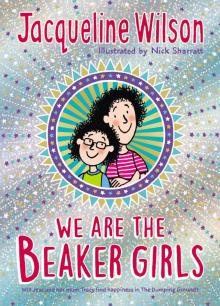 We Are the Beaker Girls
We Are the Beaker Girls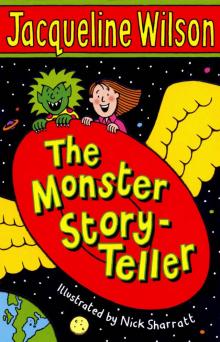 The Monster Story-Teller
The Monster Story-Teller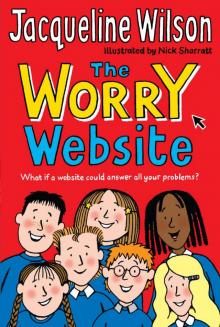 The Worry Website
The Worry Website Girls Under Pressure
Girls Under Pressure Little Darlings
Little Darlings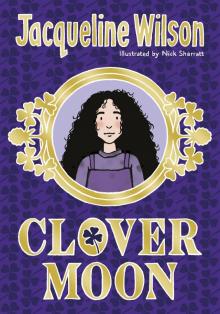 Clover Moon
Clover Moon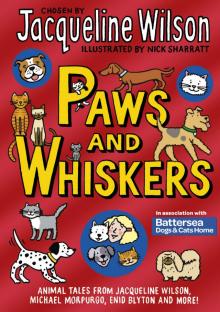 Paws and Whiskers
Paws and Whiskers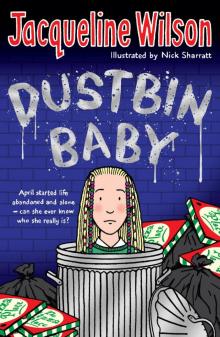 Dustbin Baby
Dustbin Baby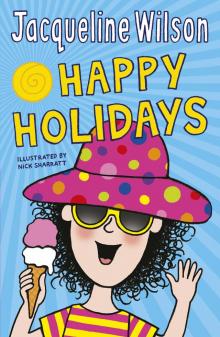 Jacqueline Wilson's Happy Holidays
Jacqueline Wilson's Happy Holidays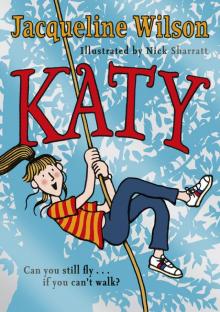 Katy
Katy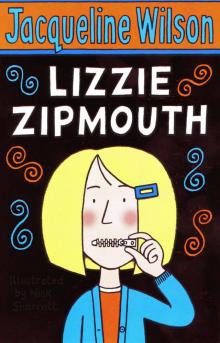 Lizzie Zipmouth
Lizzie Zipmouth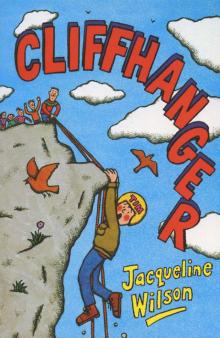 Cliffhanger
Cliffhanger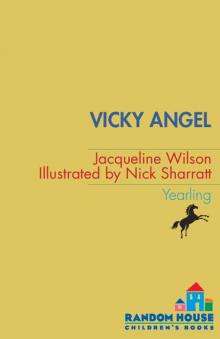 Vicky Angel
Vicky Angel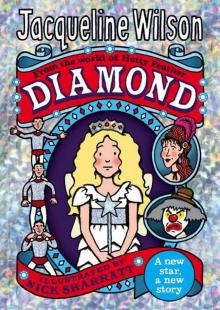 Diamond
Diamond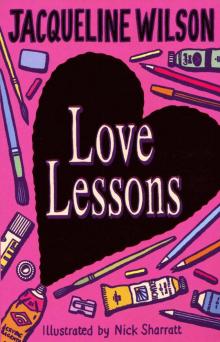 Love Lessons
Love Lessons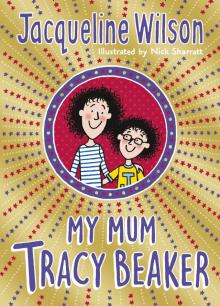 My Mum Tracy Beaker
My Mum Tracy Beaker Lola Rose
Lola Rose Jacky Daydream
Jacky Daydream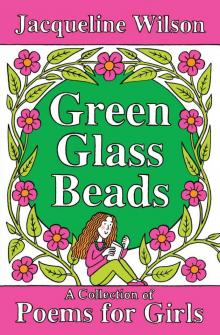 Green Glass Beads
Green Glass Beads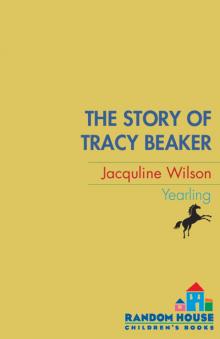 The Story of Tracy Beaker
The Story of Tracy Beaker Clean Break
Clean Break Longest Whale Song
Longest Whale Song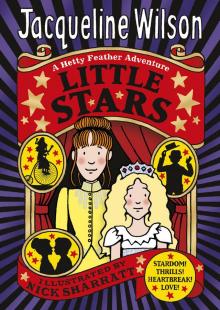 Little Stars
Little Stars Double Act
Double Act The Suitcase Kid
The Suitcase Kid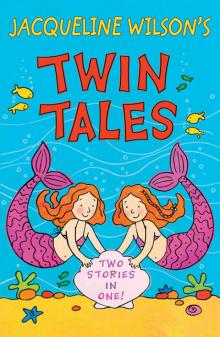 Twin Tales
Twin Tales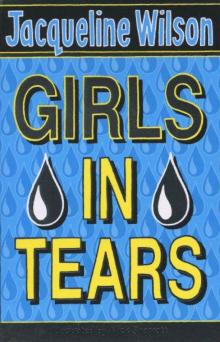 Girls in Tears
Girls in Tears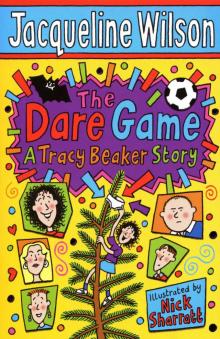 The Dare Game
The Dare Game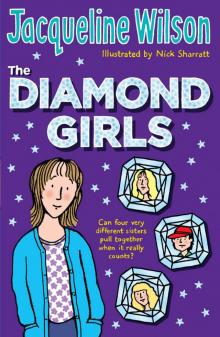 Diamond Girls
Diamond Girls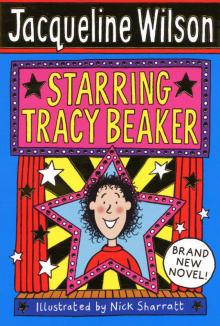 Starring Tracy Beaker
Starring Tracy Beaker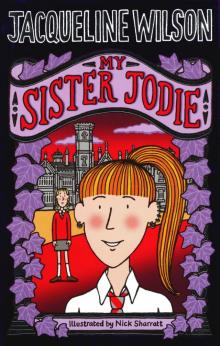 My Sister Jodie
My Sister Jodie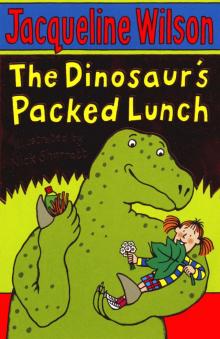 The Dinosaur's Packed Lunch
The Dinosaur's Packed Lunch Candyfloss
Candyfloss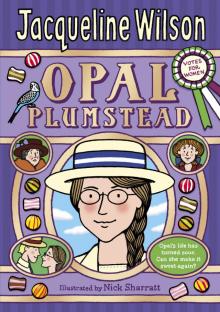 Opal Plumstead
Opal Plumstead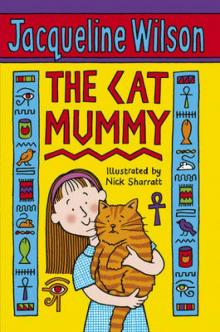 The Cat Mummy
The Cat Mummy Werepuppy and the Werepuppy on Holiday
Werepuppy and the Werepuppy on Holiday Hetty Feather
Hetty Feather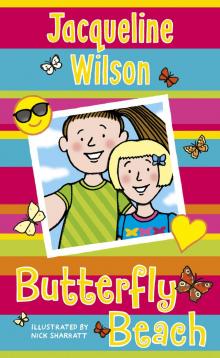 Butterfly Beach
Butterfly Beach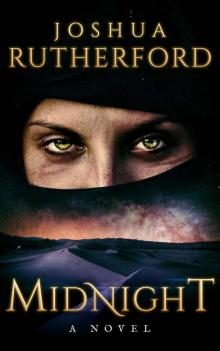 Midnight
Midnight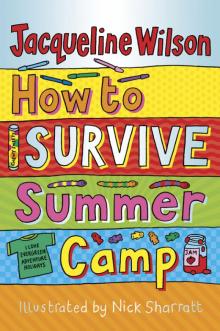 How To Survive Summer Camp (ePub)
How To Survive Summer Camp (ePub) Cookie
Cookie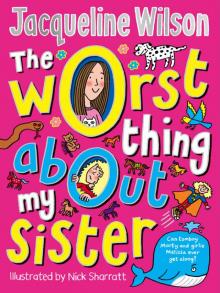 The Worst Thing About My Sister
The Worst Thing About My Sister Bad Girls
Bad Girls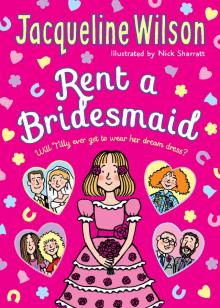 Rent a Bridesmaid
Rent a Bridesmaid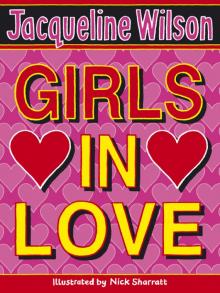 Girls in Love
Girls in Love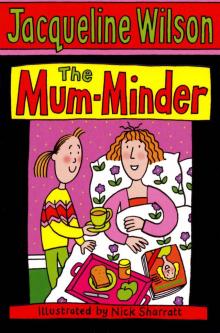 The Mum-Minder
The Mum-Minder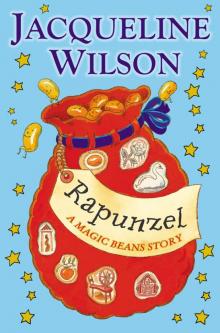 Rapunzel
Rapunzel Lottie Project
Lottie Project Best Friends
Best Friends Video Rose and Mark Spark
Video Rose and Mark Spark Glubbslyme
Glubbslyme Girls Out Late
Girls Out Late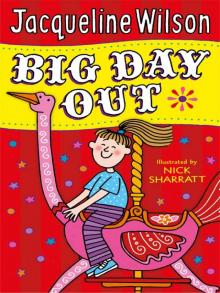 Big Day Out
Big Day Out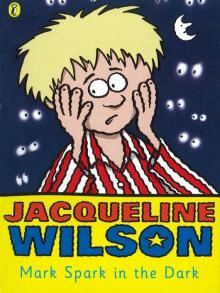 Mark Spark in the Dark
Mark Spark in the Dark Buried Alive!
Buried Alive!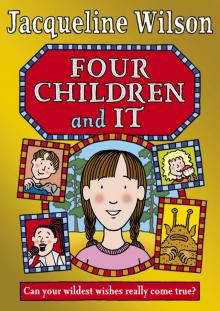 Four Children and It
Four Children and It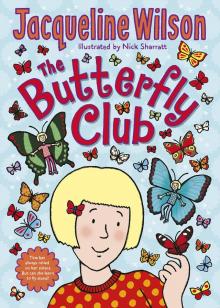 The Butterfly Club
The Butterfly Club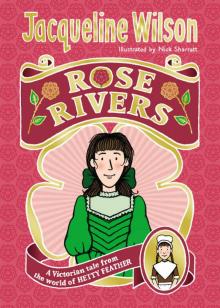 Rose Rivers
Rose Rivers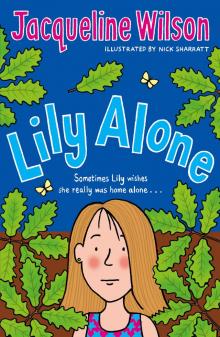 Lily Alone
Lily Alone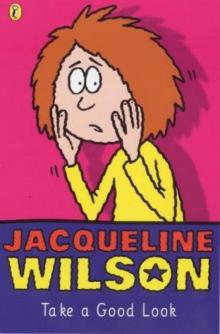 Take a Good Look
Take a Good Look My Secret Diary
My Secret Diary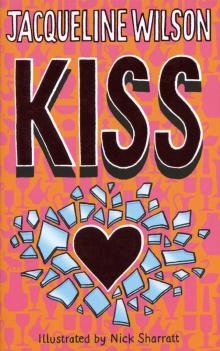 Kiss
Kiss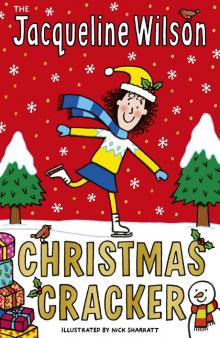 The Jacqueline Wilson Christmas Cracker
The Jacqueline Wilson Christmas Cracker The Worry Web Site
The Worry Web Site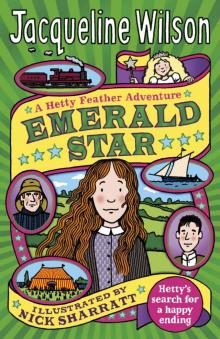 Emerald Star (Hetty Feather)
Emerald Star (Hetty Feather) The Bed and Breakfast Star
The Bed and Breakfast Star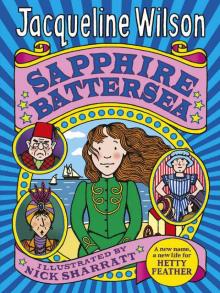 Sapphire Battersea
Sapphire Battersea Cat Mummy
Cat Mummy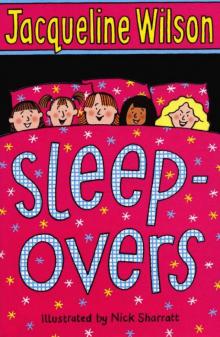 Sleepovers
Sleepovers Dare Game
Dare Game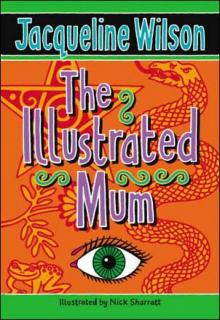 The Illustrated Mum
The Illustrated Mum Secrets
Secrets